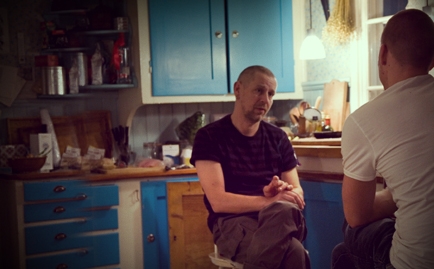You tell what you know, what you’ve earned, what you’ve learned the hard way. You watch it fall on what seem to be deaf ears, and you mutter something under your breath, something about pearls before swine. But then 10 years later, you realize one fragment of your story has now been woven into someone else’s, a very necessary thing, a bridge to a new way of understanding and living. I didn’t need proof from a theologian or a tip from a church practitioner. I needed a piece of a story, something real and full of life and blood and breath and heartache, something way more than an idea, something that someone had lived through, a piece of wisdom earned the hard way. That’s why telling our stories is so important.
There are two myths we tend to believe about our stories: the first is that they’re about us, and the second is that because they’re about us, they don’t matter. But they’re not only about us, and they matter more than ever right now. When we, any of us who have been transformed by Christ, tell our own stories, we’re telling the story of who God is. Preaching is important, certainly. But it can’t be the only way we allow God’s story to be told in our midst.
I’m less and less interested in the ruminations of a scholar and more and more compelled by stories with grit and texture and blood and guts and humanity. I’m compelled by stories from everyday people whose lives sound a lot more like mine than the stories of superstars and high achievers. I’m compelled by stories that are ugly at the beginning and then oddly beautiful, stories from around the world, stories that laugh in the faces of gender and racial and socioeconomic boundaries.
I’m not interested in talking heads discussing war and poverty from behind a desk or from behind a pulpit. I want someone to look me in the eye and tell me they’re scared too, sometimes, about the mess we’ve made around the world and the violence both around us and within us. And then I want that person to invite me down on my knees right next to them, shoulders brushing, listening to one another breathing in and breathing out.
The biggest, most beautiful story in the world deserves better than to be told by the same voices over and over again. The story really is actually being told through our little stories, and by sharing our lives, not just our sermons, we’re telling God’s story in as reverent and divine ways as it has ever been told.
When I worked at a church a few years ago, it was my job to help people tell their stories on Sunday mornings at our gatherings. And a funny thing happened. When we were at the coffee shop, when it was just me and them and their story, their story came out in fits and starts, unvarnished and raw. We cried and laughed, and every time I was amazed at what God had done in this person’s life.
And then almost every time, when they arrived on Sunday, they looked a little less like themselves. They were kind of a distant, polished, fancy version of themselves, and more remarkably, when they walked up on that stage, they sounded a lot less like themselves. They stopped believing their story was enough, and they started saying all the phrases and quoting all the verses we’ve all heard a thousand times, turning them from sacred songs into platitudes and cliches. They did it because we as a community have trained them and have been trained ourselves to believe a story isn’t enough.
I could not disagree more. Let’s resist the temptation to hide behind theology the way a bad professor hides behind theorems and formulas. We dilute the beauty of the Gospel story when we divorce it from our lives, our worlds, the words and images God is writing right now on our souls.
And let’s stop acting as if religious professionals are the only ones who have a right and a responsibility to tell God’s story. If you are a person of faith, it is your responsibility to tell God’s story, in every way you can, every form, every medium, every moment. Tell the stories of love and redemption and forgiveness every time you experience them. Tell the stories of reconciliation and surprise and new life wherever you find them.
My life is not a story about me. And your life’s not a story about you. My life is a story about who God is and what He does in a human heart. There’s nothing small or inconsequential about our stories. There is, in fact, nothing bigger. And when we tell the truth about our lives—the broken parts, the secret parts, the beautiful parts—then the Gospel comes to life, an actual story about redemption, instead of abstraction and theory and things you learn in Sunday school.
If I could ask you to do just one thing, it’s this: consider that your own silence may be a part of the problem. If you want your community to be marked by radical honesty, by risky, terrifying, ultimately redemptive truth-telling, you must start telling your truth first.
If we allow the Gospel to be told only on Sundays, only in sanctuaries, that life-changing story will lose its ability to change lives. When Christ walked among us, He entrusted the Gospel to regular people—not religious professionals. If you have been transformed by the grace of God, then you have within you all you need to write your manifesto, your poem, your song, your battle cry, your love letter to a beautiful and broken world.
This article originally appeared in the Summer 2010 issue of Neue.






















